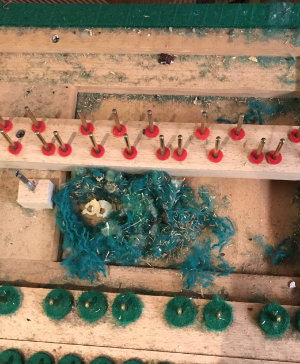Climate
Keep your piano in the most stable environment possible.
The humidity level that your piano is exposed to, and changes in that level over time, have by far the greatest effect on tuning stability and the potential service life of your piano.
While changes in temperature have an immediate effect on the tension of the strings and alter the tuning to some degree, it is the uptake of moisture by the soundboard which has the most profound effect on the instrument.
As the soundboard timber takes up moisture it expands considerably. The soundboard is built with a slight curvature called the crown, and when the timber expands this crown swells out towards the strings pushing them tighter and higher in pitch. Because the tension within the stringing scale (from one string to another) is never completely even, the strings will go out of tune at different rates relative to each other when the overall tension changes.
The repeated swelling and relaxing of the wood fibres from season to season is what ultimately destroys a soundboard creating ridges, cracks and often a negative crown. These faults can have a bad influence on sound quality and even result in the bridges being pulled off the soundboard by the strings.
Using a household dehumidifier to stabilise the relative humidity of the space in which the piano is housed will reduce tuning instability and also minimise long term damage to the piano. Aim to keep the humidity within the range 40% to 60% RH.
A Dampp-Chaser system controlled by a humidistat can also be installed directly under the soundboard in grand pianos. This is a most effective way of directly regulating moisture levels, especially when the piano is in a large space where use of a household dehumidifier would be ineffective. Please contact us if you would like to discuss installing a Dampp-Chaser system to protect your piano. Dampp Chaser website

Vermin
Always keep an eye out for signs of infestation: droppings, beetles, moths, wood dust.
Mice, Moths, Mites and Borer can inflict rapid damage to your piano over a surprisingly short period of time. Most modern pianos contain felt that is treated to deter vermin attack, but this is not always effective.
Salt
If you live near the sea always keep your piano closed when it is not being used.
Seaside locations can be bad news for grand pianos in particular. Salt in the air which is allowed to land on the polished plain wire strings can cause rapid corrosion. To prevent this we can supply a transparent cover to protect the tuning pin area and also lightly oil the speaking length of the strings to prevent corrosion. This treatment must only be carried out by a professional as even the slightest bit of oil in the wrong place can be disastrous for the piano.


